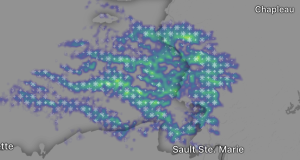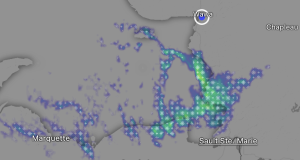Today, the Nuclear Waste Management Organization (NWMO) announced it has selected Wabigoon Lake Ojibway Nation (WLON) and the Township of Ignace as the host communities for the future site for Canada’s deep geological repository for used nuclear fuel.
In July, Ignace resident voted yes to move forward in the process. Earlier this month, the Wabigoon Lake Ojibway Nation voted voted yes in a willingness referendum that demonstrated the Nation’s willingness to enter the next phase of in-depth environmental and technical assessments, to determine safety and site suitability.
News Release from NWMO:
Today, the Nuclear Waste Management Organization (NWMO) announced it has selected Wabigoon Lake Ojibway Nation (WLON) and the Township of Ignace as the host communities for the future site for Canada’s deep geological repository for used nuclear fuel.
Canadians and Indigenous peoples have been clear that it is essential to take responsibility now, in this generation, to safely manage Canada’s used nuclear fuel for the long term. This announcement is an important milestone in delivering on that promise to not leave it as a burden for future generations to manage.
“This is a historic moment,” said Laurie Swami, NWMO President and CEO. “This project will solve an environmental issue and supports Canada’s climate change goals. And today’s decision was driven by a consent-based siting process led by Canadians and Indigenous peoples. This is what making history looks like.”
There is international scientific consensus that a deep geological repository is the safest way to manage used nuclear fuel over the long term, and Canada is among the leading countries on this solution.
The NWMO launched its community-driven, consent-based site selection process in 2010. It included clear commitments that Canada’s plan for used nuclear fuel could only move forward in an area with a site that meets rigorous safety standards and that has informed and willing hosts. The project also needs to be implemented in a way that advances community well-being as defined by the host communities.
The people of both host communities have demonstrated their willingness to move forward in this process. Earlier this month, WLON confirmed its willingness, following a decision-making process that was open to all its members. The Township of Ignace completed a decision-making process with its residents in July, which also confirmed willingness.
This important decision for Canada was possible because of the communities’ leadership and active engagement over a decade of learning, as well as considering the future of their communities. The safety of the site was also established through rigorous site assessment and technical studies.
“We have learned so much from all the communities that took part in this process over the years,” said Lise Morton, NWMO Vice-President of Site Selection. “By challenging us, they helped the NWMO grow and become a better organization, and they directly shaped this project.”
The project will drive a wide range of benefits for both host communities, the region and Canada as a whole over the 175-year timeline of the project. These include new jobs and investments in community well-being driven by the priorities communities themselves defined.
As the project now advances into the regulatory decision-making process, Canada will take another step forward on this long-term management solution for its used nuclear fuel, which will protect people and the environment, including water, while supporting its goals around energy security and climate change.
- Highway 17 (Wawa to Batchawana) CLOSED – Jan 27 23:33 - January 27, 2026
- Highway 17 (Wawa to Batchawana) OPEN – Jan 27, 12:47 - January 27, 2026
- Emergency Services respond to collision on Mackey - January 27, 2026
 Wawa-news.com Local and Regional News
Wawa-news.com Local and Regional News

